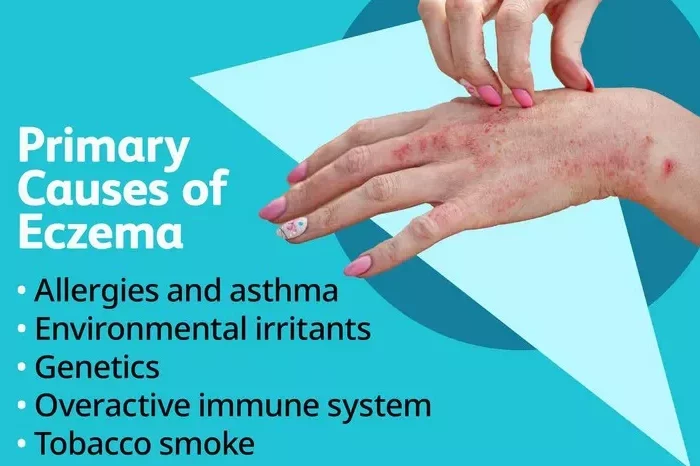Eczema, a chronic and often perplexing skin condition, affects millions of individuals worldwide. Characterized by red, inflamed, and itchy skin, eczema can significantly impact one’s quality of life. Despite its prevalence, the precise causes of eczema remain elusive, prompting a deeper exploration into the multifaceted factors that contribute to its onset. In this comprehensive article, we will delve into the intricate web of elements that can trigger eczema, shedding light on both genetic and environmental influences.
Genetics: Unraveling the Inherited Predisposition
A significant percentage of eczema cases can be attributed to genetic factors. Individuals with a family history of eczema, asthma, or allergic rhinitis are more likely to develop eczema themselves, suggesting a hereditary component. Research has identified specific genes associated with a higher susceptibility to eczema, underscoring the importance of genetic predisposition in this skin condition.
Understanding the genetic basis of eczema involves recognizing variations in genes responsible for skin barrier function and immune response. Mutations in these genes can compromise the skin’s ability to retain moisture, leading to dryness and susceptibility to irritants. Additionally, alterations in immune system genes can contribute to an overactive immune response, triggering inflammation and exacerbating eczema symptoms.
While genetics play a crucial role, they represent just one piece of the complex puzzle. Environmental factors also play a pivotal role in the development and exacerbation of eczema.
Environmental Triggers: Unmasking External Influences
Beyond genetic predisposition, environmental factors can significantly impact the onset and severity of eczema. These triggers range from allergens and irritants to lifestyle and climate conditions, each contributing to the delicate balance of skin health.
1. Allergens:
Substances that provoke allergic reactions are common culprits in eczema flare-ups. Allergens can include pollen, pet dander, mold, and certain foods. Identifying and avoiding these triggers is crucial for managing eczema symptoms. Allergy testing can aid in pinpointing specific allergens that may be exacerbating the condition.
2. Irritants:
Harsh chemicals and irritants found in soaps, detergents, and personal care products can strip the skin of its natural oils, leading to dryness and irritation. Fragrances, preservatives, and certain fabrics can also contribute to eczema symptoms. Opting for hypoallergenic and fragrance-free products can help minimize the risk of skin irritation.
3. Climate and Weather Conditions:
Environmental factors such as extreme temperatures, humidity levels, and exposure to harsh weather conditions can impact eczema. Cold and dry climates can exacerbate dry skin, while hot and humid conditions may trigger sweating and irritation. Understanding how climate affects eczema can inform proactive measures, such as moisturizing and adjusting clothing choices accordingly.
4. Microbial Infections:
Bacterial, viral, and fungal infections can worsen eczema symptoms. Scratching compromised skin can introduce bacteria, leading to infections that further inflame the skin. Maintaining good hygiene practices and promptly addressing any signs of infection is essential in managing eczema.
5. Stress and Emotional Factors:
Psychological stress and emotional factors can contribute to eczema flare-ups. Stress activates the body’s inflammatory response, potentially worsening existing skin conditions. Developing stress-management techniques, such as mindfulness and relaxation exercises, can play a crucial role in eczema management.
While genetics and environmental factors are integral components of the eczema puzzle, the interplay between the two further complicates our understanding of this complex skin condition.
The Interplay: Navigating the Dynamic Relationship
The relationship between genetics and the environment in eczema is dynamic and intricate. Genetic predisposition may create vulnerability, but environmental triggers ultimately determine the course and manifestation of the condition. Individuals with a genetic predisposition may not develop eczema if they are not exposed to relevant environmental triggers, highlighting the importance of a holistic approach in understanding and managing eczema.
Preventive Measures: Strategies for Eczema Management
Given the multifactorial nature of eczema, a comprehensive approach to management involves addressing both genetic and environmental aspects. Here are key strategies for preventing and managing eczema:
1. Moisturization:
Maintaining skin hydration is crucial for individuals with eczema. Regular and liberal use of moisturizers helps strengthen the skin barrier and prevent excessive dryness. Opt for fragrance-free and hypoallergenic moisturizers to minimize the risk of irritation.
2. Identifying and Avoiding Triggers:
Conducting allergy tests and identifying specific triggers, whether allergens or irritants, is essential. Once identified, taking proactive measures to avoid these triggers can significantly reduce the frequency and severity of eczema flare-ups.
3. Proper Skincare Practices:
Gentle skincare practices play a pivotal role in eczema management. Use mild, fragrance-free soaps and cleansers, and avoid hot water, which can strip the skin of its natural oils. Pat the skin dry instead of rubbing to minimize irritation.
4. Stress Management:
Incorporating stress-management techniques, such as meditation, yoga, or deep breathing exercises, can help mitigate the impact of emotional factors on eczema. Creating a balanced and healthy lifestyle is essential for overall well-being.
5. Medical Intervention:
In severe cases, medical intervention may be necessary. Topical corticosteroids, immunomodulators, and antihistamines are among the medications prescribed to manage eczema symptoms. Consultation with a dermatologist or allergist can help develop an individualized treatment plan.
Conclusion
Eczema’s complexity lies in the intricate interplay between genetic predisposition and environmental triggers. While our understanding of the condition has grown significantly, much remains to be discovered. Acknowledging the multifactorial nature of eczema is essential for developing effective prevention and management strategies.
As research continues to unveil the mysteries surrounding eczema, a holistic and personalized approach remains paramount. By combining genetic insights with a thorough understanding of environmental triggers, individuals and healthcare professionals can work collaboratively to navigate the dynamic landscape of eczema and improve the quality of life for those affected by this challenging skin condition.

























